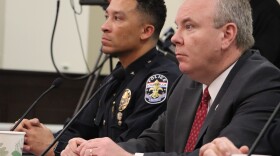A member of Kentucky’s House GOP leadership filed a bill Friday to amend the state constitution to allow lawmakers to fund private and religious schools.
House Bill 2, sponsored by Majority Caucus Chair Suzanne Miles, is the second measure filed this session that would allow taxpayer dollars to go towards tuition and other educational expenses outside the public school system.
A measure filed by Republican Rep. Josh Calloway earlier this month, House Bill 208, proposes a similar change.
HB 2 would amend parts of the constitution that have been the downfall of previous attempts by lawmakers to create programs to fund private and charter schools. Advocates refer to such policies as “school choice.”
Courts have repeatedly interpreted sections of the 1891 constitution as preventing tax dollars from being spent outside the system of “common schools” — the constitution’s language for public schools.
HB 2 would allow lawmakers to ignore those sections so that “the General Assembly may provide financial support for the education of students outside the system of common schools.”
The proposed amendment would also give lawmakers leeway in where they do and do not allow private school funding — apparently seeking to avoid prohibitions against “special legislation” that tripped up a 2021 tax-credit scholarship program.
A circuit court judge ruled against the 2021 tax-credit scholarship program in part because it funded private school tuition in some counties, but not others. The judge said that amounted to “special legislation,” which is not permitted under the constitution.
HB 2 says the Legislature may exercise its authority to fund nonpublic schools “in particular places as it deems proper.”
In addition, the measure would let lawmakers ignore the constitution’s prohibitions against spending tax dollars collected for educational purposes on churches or religious schools.
The measure faces a steep hill to become law. The proposal is divisive among House Republicans. While leadership has expressed an interest in funding for private schools, historically many rural Republicans have sided with the vast majority of Democrats who worry that “school choice” programs will divert funding from the public school system.
If the measure survives both chambers it would still need approval from Kentucky voters. They would vote on the constitutional change in the 2024 General Election.
Miles, the bill sponsor, did not immediately respond to request for comment.
Copyright 2024 Louisville Public Media. To see more, visit Louisville Public Media. 9(MDAxODQ3NzExMDEyMTczNzkxNDU5MmE1Yg004))





